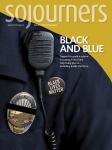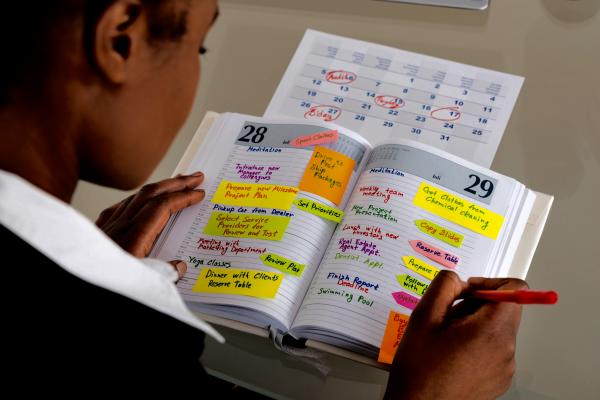ORDINARY TIME CONTINUES, in this season after Pentecost. The designation “ordinary” always strikes me as odd. This season is anything but ordinary in the common way in which we use the term. Ordinary typically means that something has no special or unique characteristics. Ordinary is simple, average, unexciting.
In one sense, the lectionary passages can be described as ordinary. There are no mighty battles or astonishing miracles or dreamy visits from God. The text is full of practical teaching, of how to live out the life of faith. Ordinary, right? And yet, the life to which the Spirit calls us is anything but ordinary.
A couple of warnings are in order. If you’re looking for material for “Seven Steps to (fill in the blank)”-style preaching and teaching, then don’t look here. These passages are not going to give you warm fuzzies about your personal relationship with Jesus. There’s nothing watered down or simple about God’s teaching and commands in these passages. We are called to nothing less than radical discipleship: Take up crosses, extend and receive God’s mercy, prioritize the poor for our salvation, and establish communities of trust. If you discover anything truly ordinary as you study and reflect, it is yourself. You cannot live this life ordinarily. We are in the stretch between Pentecost and Advent. You’ll need to connect to the power and patience of these traditions in order to live out the extraordinary call God has placed before such ordinary people.
[September 4]
Making Choices
Deuteronomy 30:15-20; Psalm 1; Philemon 1:1-21; Luke 14:25-33
FOLLOWING JESUS is a costly business, as Luke reminds us, requiring sacrifice and shedding of our slave mind in order to move in freedom. But is that what we find in much of U.S. Christianity? In studying the spiritual lives of U.S. teenagers, sociologists Christian Smith and Melinda Lundquist Denton determined that teens’ reigning religious worldview can be described as “moralistic therapeutic deism.” Moralistic: God wants people to behave. Therapeutic: God wants everyone to be happy. Deism: God exists and started the world turning, but is now remote, without personal engagement.
Those from the underside of U.S. life, the disinherited, recognize this worldview for what it truly is: the leftovers from a Christianity that is more American than it is Christian. Frederick Douglass described it as “the corrupt, slaveholding, women-whipping, cradle-plundering, partial, and hypocritical Christianity of this land.”
However, moralistic therapeutic deism isn’t confined to teenagers; it’s also a dominant religious expression across ages in contemporary American life, especially among whites. Here’s the problem though: When people don’t “behave,” are they seen as acting against God? How do people with their backs against the wall maintain happiness? Are we alone in resolving the pervasive evil and brokenness of the world? This false faith can’t cope with the guilt and responsibility that morally is required because of human sin and evil.
Blessings and curses are set before us. Choosing the blessed life means taking up a cross. Any other way presumes that humans can save themselves and our creation. Taking this route is what got us in the mess we’re in. We need a God that fixes our mess while empowering us with a second chance to participate in the recovery plan. Choose the costly grace. Choose life with God. As anti-Nazi Lutheran pastor Dietrich Bonhoeffer reminds us: “Grace is costly because it calls us to follow, and it is grace because it calls us to follow Jesus Christ.”
[ September 11 ]
Who Is a Slave?
Exodus 32:7-14; Psalm 51:1-10; 1 Timothy 1:12-17; Luke 15:1-10
IN EXODUS, we hear the ancient story. The Hebrews have suffered for years under Egyptian oppression. God declares their liberation. Even as Moses marches them to freedom, their minds remain in bondage. They want to worship and live like their former oppressors. In Luke, we hear about the Pharisees, who stand in the tradition of Moses; a tradition of seeking freedom from bondage. Yet they condemn Jesus for welcoming and eating with “sinners” (15:2). The Pharisees want to deny exodus to those whom Jesus seeks to offer it. The Pharisees uncover their own captivity to the status quo. Internalized oppression is the threat in both stories.
The quote attributed to Harriet Tubman is relevant here: “I could’ve freed ... more if only they knew they were slaves.” Where one is righteous, many continue to stumble. Where many are righteous, there are only a few who have lost their way. Who can bear with a people who so easily fall into such traps? Justice alone doesn’t guarantee holiness of heart. Self-righteousness lies ready to re-enforce the bondage from which the oppressed are set free. Brazilian Paulo Freire wrote that “Liberation is ... a childbirth, and a painful one.” Through liberation we are born again.
What about going from childbirth to maturity? Liberation doesn’t remove the guilt and shame of bondage. Another force is needed to move the liberated to wholeness. On display in these passages is the God of deliverance and patience, the One who sets free and forgives. God extends not only liberation, but mercy. Liberation and mercy are needed. Mercy is not getting what is deserved. Liberation frees us. Mercy cleanses us. “Have mercy on me, O God, according to your steadfast love; according to your abundant mercy blot out my transgressions. Wash me thoroughly from my iniquity, and cleanse me from my sin” (Psalm 51:1-2).
[ September 18 ]
Cheating the System
Amos 8:4-7; Psalm 113; 1 Timothy 2:1-7; Luke 16:1-13
THIS WEEK'S theological highlight is the preferential option for the poor. The parable of the dishonest manager in Luke sheds light on this theme better than any. Without the master’s knowledge, the manager reduces the debts of the master’s customers in order to make friends with them so they will open their homes to him once he is fired from his job. Given the economic caste system of the day, the manager’s actions are discerning and calculative. After being alerted to his shaky employment status, the manager prepared for what was to come. He cheats the economic system of his workplace in order to secure a stable life for himself following termination.
Though Jesus acknowledges the manager’s misconduct, he also commends the manager’s shrewdness. Jesus exposes that living in the present in light of the future is bound up with how we use our money and resources. The manager’s motives for reducing debt are selfish. He helps these customers expecting something in return. But Jesus demands that we not look for reciprocation; that we give to the poor, especially those who cannot give money in return. Like the manager, Jesus calls us to interrupt the world’s economic system, to resist its vision of how things ought to be—the poor staying poor and the rich staying rich. This is cheating the world’s system for the sake of the kingdom’s system; of living now in this age, as citizens of the kingdom of heaven!
The social distinctions of rich and poor—and the means by which these are established and reinforced—cease to exist in God’s community. The kingdom ethic of relationships is grounded in love and selflessness. And in equality. Giving is not one-way in this story. The poor may not reciprocate with money, but they don’t just receive. Jesus says that the poor welcome us into eternal homes. They welcome us all into a space where we can put down our clamor for prestige, our striving for power, our addiction to labels, and our weapons of division. The poor welcome us all into the space of God’s home, of true identity, where all that matters is that we are all children of God.
[ September 25 ]
Identity Politics
Amos 6:1a, 4-7; Psalm 146; 1 Timothy 6:6-19; Luke 16:19-31
THE POLITICS OF identity is a core feature in these passages. The rich (“who lie on beds of ivory” or dress in “fine linen”) always make an easy target as the enemy. Scripture is clear that inherent to financial wealth are the traps of greed and pride. But wealth does not only consist of money. There also is cultural wealth, which so often escapes our contemporary judgment. Not so with the prophets. Amos launches a strong critique of self-indulgence within the Israelite community. The longstanding leadership within the culture is suspect if it doesn’t care for those on the margins. Even a community under tyranny can neglect its own. The distinction between oppressor and oppressed collapses in the human heart.
The gospel writer gets even more specific. A rich man abandons care for a beggar—both children of Israel. Cultural and ethnic affinity cannot overcome the chasm the rich man has set between himself and Lazarus. None of our possessions, whether money or culture, are ours for the taking.
We didn’t bring anything into this world. All we have is a gift from God and thus to be shared. Not stolen. Not protected. Shared. This takes a community of trust that escapes our age-old captivity to identity politics. Multiculturalism and nationalism are mirages. They operate by control rather than trust.
Our identity in the divine, in eternity, is more basic than our religious, racial, gender, class, and any other identities. When bell hooks talks about identity politics, she quotes James Baldwin: “It’s not a question of whether you’re gay or straight or black or white: What do you stand for? Who are you? How can you know that—and operate from that position of power?” We belong to one another by our shared created-ness and capacity for goodness. We are a Beloved Community.
“Living the Word” reflections for October can be found here. “Preaching the Word,” Sojourners’ online resource for sermon preparation and Bible study, is available at sojo.net/ptw.

Got something to say about what you're reading? We value your feedback!

